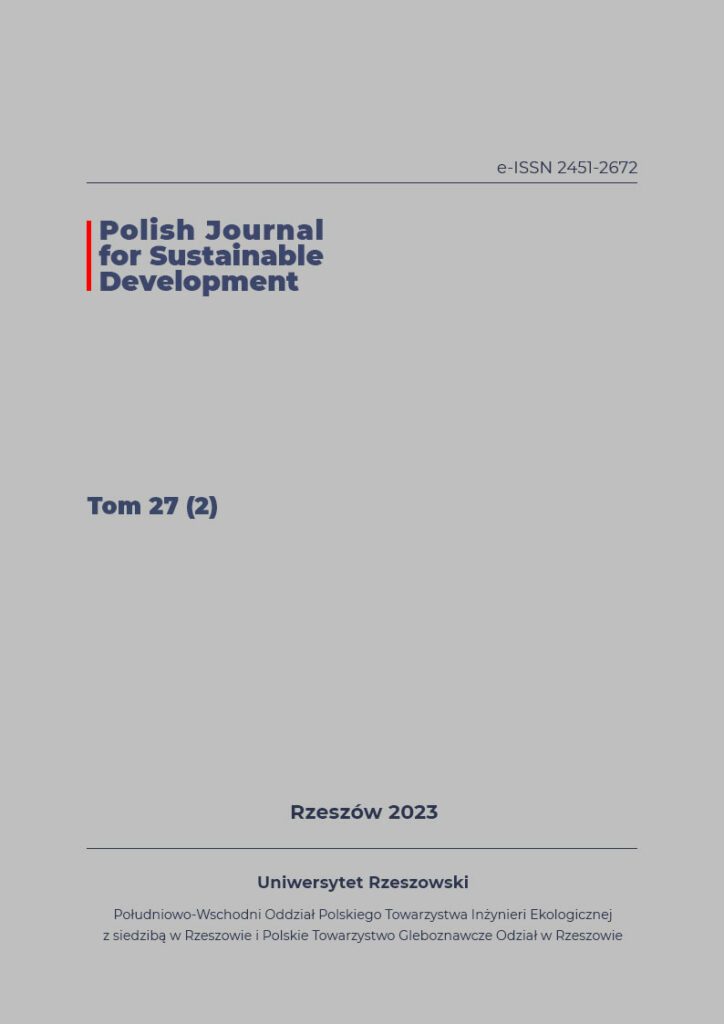Limiting selected production means in winter rape cultivation: challenges and opportunities for maximizing yield while maintaining ecological aspects
DOI:
https://doi.org/10.15584/pjsd.2023.27.2.2Keywords:
cultivation intensity, sustainable, environmental pollution, ecological aspect, efficiencyAbstract
The research conducted in 2021-2022 is preliminary and its aim was to draw attention to the benefits of maintaining ecological aspects in agricultural production. The experiment compared the response of two varieties of winter rapeseed (Tigris, Riccardo KWS) to two levels of cultivation intensity and the profitability of the applied agrotechnical treatments. The research shows that the yield and chemical composition of seeds depended on the cultivation technology used. More favorable economic effects were obtained from growing winter rapeseed at a medium-intensity level (A2), despite the lower yield. The Tigris variety exceeded the Riccardo KWS F1 variety in the tested parameters. It has been shown that in less intensive cultivation systems, the efficiency of the use of production inputs increases, which may contribute to reducing the negative impact on the natural environment.
Downloads
References
Bartkowiak-Broda I., Wałkowski T., Ogrodowczyk M. 2005. Przyrodnicze i agrotechniczne możliwości kształtowania jakości nasion rzepaku. Pamiętnik Puławski. 139. 7-25.
Bełdycka-Bórawska A. 2023. Changes in the production of rapeseed in Poland after accession to the european union. Annals PAAAE 25 (4). doi: 10.5604/01.3001.0053.9443.
Budzyński S.W., Jankowski J.K., Truszkowski W. 2005. Rolnicza i ekonomiczna efektywność technologii produkcji nasion rzepaku ozimego w wybranych gospodarstwach wielkoobszarowych. Rośliny oleiste. 26. 407-409.
Jamiłkowska A., Hetman B., Skwaryło-Bednarz B., Kopacki M. 2017. Integrowana ochrona roślin w Polsce i Unii Europejskiej oraz prawne podstawy jej funkcjonowania. Praca poglądowa. Annales UMCS Sectio e Agricultura. 72 (1). doi: 10.24326/as.2017.1.8.
Jaskulska I., Jaskulski D. 2003. Wpływ wieloletniego nawożenia na kształtowanie właściwości gleby. Postępy Nauk Rolniczych. 4. 21-35.
Jarecki W., Skrobacz K., Lachowski T. 2022. Wpływ nawożenia dolistnego na plonowanie i skład chemiczny nasion rzepaku ozimego (Brassica napus L.). Agronomy Science. 77 (4). 49-59. doi: 10.24326/as.2022.4.4.
Jarecki W., Buczek J., Bobrecka-Jamro D. 2014. Efektywność ochrony insektycydowej rzepaku ozimego acetamiprydem. Fragm. Agron. 31(1). 18-24.
Koćmit A., Tomaszkiewicz T., Podlasiński M., Błażejczak D. 2008. Wpływ intensywnego użytkowana rolniczego na gleby średnie i ciężkie w warunkach Pomorza zachodniego. Cz.II. Rozwój procesów degradacji. Roczniki gleboznawcze. Warszawa. 59 (3/4). 142-151.
Kotecki A., Bartkowiak-Broda I., Jankowski K., Kołodziejczyk M., Kozak M, Kulig B., Serafin-Andrzejewska M. 2020. Uprawa roślin Tom 3. Wydawnictwo Uniwersytetu Przyrodniczego we Wrocławiu. 3. 317-376.
Lemanowicz J., Bartkowiak A. 2013. Wpływ intensywności uprawy roślin na zawartość i rozmieszczenie fosforu oraz metali ciężkich w wybranych profilach gleb płowych. Przegląd Naukowy: Inżynieria i Kształtowanie Środowiska. 61. 273-280.
Nieróbca P., Grabiński J., Szeleźniak E. 2008. Wpływ intensywności technologii uprawy zbóż w płodozmianie zbożowym na efektywność produkcyjną i ekonomiczną. Acta. Sci. Pol. Agricultura 7 (3). 73-80.
Rudko T. 2011. Uprawa rzepaku ozimego. Rzepak-zasady uprawy-zdrowa żywność, Instytut Agrofizyki im. Bohdana Dobrzańskiego PAN w Lublinie. 6-66.
Tańska M., Rotkiewicz D. 2003. Wpływ różnych czynników na jakość nasion rzepaku. Rośliny Oleiste. 24. 596-616.
Wielebski F., Wójtowicz M. 2004. Wpływ czynników agrotechnicznych na skład chemiczny nasion odmiany mieszańcowej zrestorowanej w porównaniu z odmianą populacyjną i odmianami mieszańcowymi złożonymi. Rośliny oleiste. 25. 505-517.
Downloads
Published
Issue
Section
License
Copyright (c) 2023 Polish Journal for Sustainable Development

This work is licensed under a Creative Commons Attribution-NonCommercial-NoDerivatives 4.0 International License.


